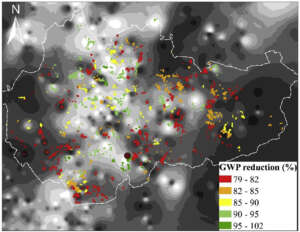LCA based methodology for spatial and temporal variation of climate impactfrom biobased energy
Spatial variation in global warming potential (GWP) reduction compared with diesel of using the grass-based biogas system, without fossil fuel substitution. Colours indicate site-specific GWP reduction. Background indicates the soil pH, where a darker shade indicates lower pH. The white dashed line represents the municipality border.
Background
Aims
Approaches
.
Keywords
Links
Project leaders
Other project members
Other funding agencies

